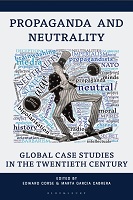Propaganda and Neutrality
Global Case Studies in the Twentieth Century
Contributor(s)
Corse, Edward (editor)
García-Cabrera, Marta (editor)
Collection
Knowledge Unlatched (KU)Language
EnglishAbstract
This is the first broad-ranging, comprehensive and comparative study of the concepts of propaganda and neutrality. Bringing together world-leading and early career historians, this open access book explores case studies from the time of the First World War to the end of the Cold War in countries such as Belgium, Greece, Spain, Portugal, Ireland, Switzerland, Vichy France, USA, Argentina, Turkey, Portuguese Macau, Brazil, South Africa, Laos, Yugoslavia, Egypt, India, Malta, and Sweden. The individual chapters analyse the methods and channels of propaganda utilised in neutral countries, including rumours, newspapers, cartoons, films, pamphlets and magazines as well as radio broadcasts, official reports, diplomatic movements, cultural campaigns and soft power. They look to understand how these methods and channels have been deployed and how effective they have been in changing or reinforcing opinions and outcomes. Finally the book highlights the interaction between the concepts of propaganda and neutrality. It considers whether neutrality is a form of propaganda in itself, whether it is possible to be truly neutral in any propaganda battle and how the different forms of neutrality, including projected strict neutrality, non-belligerency and non-alignment, have been utilised by neutrals and belligerents to achieve propaganda goals in the last 120 years. The ebook editions of this book are available open access under a CC BY-NC-ND 4.0 licence on bloomsburycollections.com. Open access was funded by Knowledge Unlatched.


 Download
Download Download
Download Web Shop
Web Shop